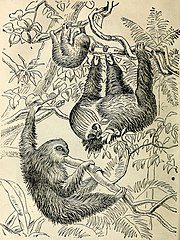Introduction to Psychology 1/IPSY103/Evolutionary psychology/Gene selection theory
In modern evolutionary theory, all evolutionary processes boil down to an organism’s genes. Genes are the basic “units of heredity,” or the information that is passed along in DNA that tells the cells and molecules how to “build” the organism and how that organism should behave. Genes that are better able to encourage the organism to reproduce, and thus replicate themselves in the organism’s offspring, have an advantage over competing genes that are less able. For example, take female sloths: In order to attract a mate, they will scream as loudly as they can, to let potential mates know where they are in the thick jungle. Now, consider two types of genes in female sloths: one gene that allows them to scream extremely loudly, and another that only allows them to scream moderately loudly. In this case, the sloth with the gene that allows her to shout louder will attract more mates—increasing reproductive success—which ensures that her genes are more readily passed on than those of the quieter sloth.
Essentially, genes can boost their own replicative success in two basic ways. First, they can influence the odds for survival and reproduction of the organism they are in (individual reproductive success or fitness—as in the example with the sloths). Second, genes can also influence the organism to help other organisms who also likely contain those genes—known as “genetic relatives”—to survive and reproduce (which is called inclusive fitness). For example, why do human parents tend to help their own kids with the financial burdens of a college education and not the kids next door? Well, having a college education increases one’s attractiveness to other mates, which increases one’s likelihood for reproducing and passing on genes. And because parents’ genes are in their own children (and not the neighborhood children), funding their children’s educations increases the likelihood that the parents’ genes will be passed on.
Understanding gene replication is the key to understanding modern evolutionary theory. It also fits well with many evolutionary psychological theories. However, for the time being, we’ll ignore genes and focus primarily on actual adaptations that evolved because they helped our ancestors survive and/or reproduce.
